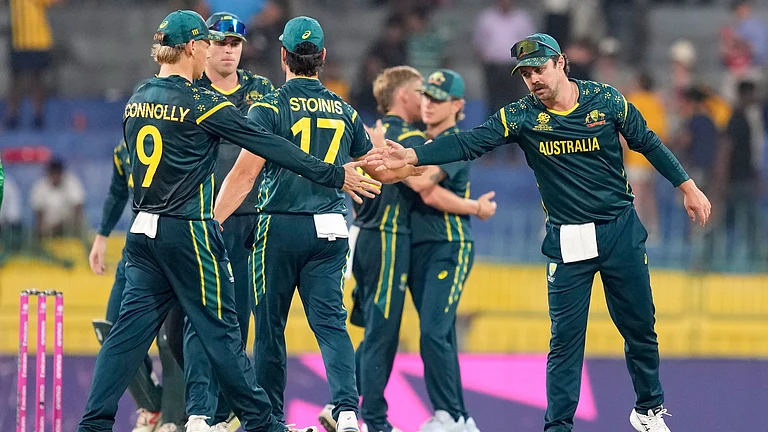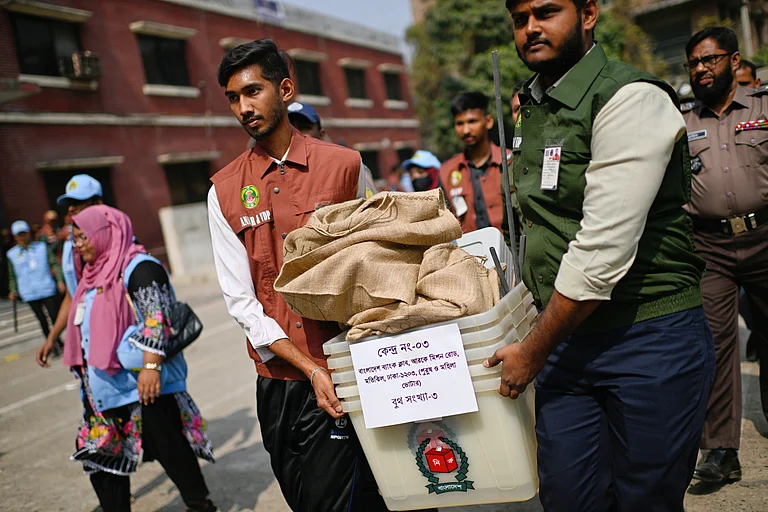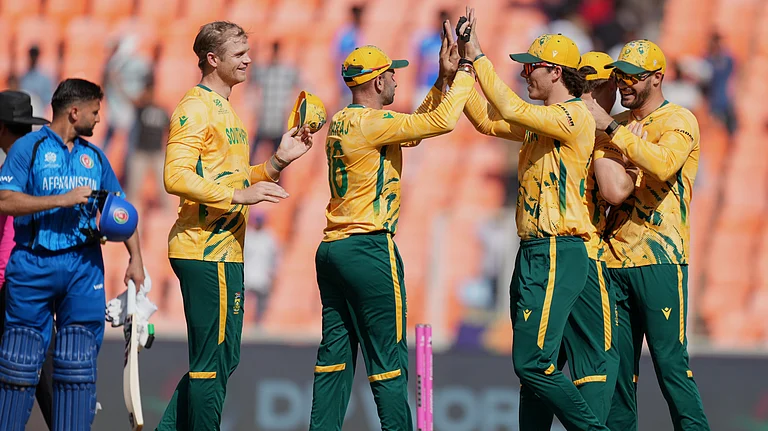Amid a surge in Covid-19 cases in Delhi, Delhi Chief Minister Arvind Kejriwal on Friday chaired a meeting to review the situation in the national capital.
Speaking to reporters after the meeting, Kejriwal said the Delhi government is keeping an eye on the spurt in Covid-19 cases in Delhi and is "prepared to face any eventuality". He added that genome sequencing of all positive samples was being conducted to timely identify any new variants.
Only three deaths have been reported over the last four-five days and, in all three patients, co-morbidities were "very severe" and it has been assessed that the fatality was due to co-morbidities and perhaps Covid was "incidental", but one can't say that, said Kejriwal.
In a separate development, authorities in North-West Delhi ordered increased testing in the wake of rising cases. The office order accessed by Outlook also stated that Covid-appropriate behaviour was to be followed in all offices. The order was issued on Wednesday.
What did Arvind Kejriwal say?
Delhi Chief Minister Arvind Kejriwal said there was no need to worry for now and that the city government was taking all required steps.
"The Delhi government is keeping an eye on the Covid-19 situation and it is prepared to face any eventuality", said Kejriwal.
Kejriwal said the XBB.1.16 is the predominant variant at present in Delhi, accounting for 48 per cent of all positive cases. He added that the strain spreads rapidly but is not severe at all.
On the vaccination front, Kejriwal said all adults in Delhi had been fully vaccinated against Covid-19 while all eligible people below the age of 18 had been given the second dose. He added that all Delhi government hospitals had been directed to maintain isolation wards for Covid patients.
He said, "We have enough beds, ambulances, sufficient oxygen and storage capacity as of now. We have 7,986 Covid beds. These include oxygen beds, ventilator beds and ICU beds. Only 66 are occupied as of now."
In response to a query on regulations related to the use of masks, Kejriwal added that no new guidelines had come from the Centre and, "as and when we will receive it, we will take action accordingly".
"We had also conducted testing of samples drawn from sewage and, till mid-February, the Covid positivity result was zero. But in the last 15 days, some samples have turned out positive," said Kejriwal.
The government has sufficient capacity to conduct RT-PCR tests. Government labs have the capacity to conduct 4,000 tests a day while up to a lakh tests per day can be done at private facilities, added Kejriwal.
At the airport, random testing is being conducted on two per cent of the passengers, Kejriwal said.
What we know of XBB.1.16 strain?
Even before Delhi Chief Minister Arvind Kejriwal said that XBB.1.16 strain is active in Delhi, experts had said that the strain could be be driving force behind the Delhi Covid-19 surge.
The XBB.1.16 strain is one of the many strains of the SARS-CoV-2 virus, which causes Covid-19 disease. Like any other virus, SARS-CoV-2 has evolved over time and has acquired a number of mutations over time. These mutations lead to the emergence of several variants and sub-variants.
Variants of the virus evolve further and make sub-branches called sub-variants. Some of the well-known variants are Alpha, Delta, and Omicron. They have several sub-variants. For example, the Delta variant that led India's deadly second Covid-19 wave has up to 200 sub-variants. In common terms, any mutated form of the virus is called a strain. It can refer to both a variant and sub-variant.
While most mutations are fairly regular, some mutations make the virus more transmissible (such as Omicron) or deadlier (such as Delta).
The XBB.1.16 variant is a recombinant —a mixture, simply speaking— strain of BA.2.10.1 and BA.2.75 sublineages, according to WHO.
The WHO notes that XBB.1.16 was first documented on January 23. It is currently designated as a variant under monitoring along with other variants.
Notably, BA.2.10.1 and BA.2.75 are both sub-variants of highly transmissible variants of Omicron. Recently, another sub-variant of Omicron named BF.7 was believed to be fuelling the deadly Covid-19 wave in China.
Severe respiratory cases to be tested: NW District
The North-West Delhi district health authorities to mandatorily carry out rapid antigen tests (RAT) in two classes of patients.
Local health authorities were directed to conduct RAT testing of all severe acute respiratory illness (SARI) and 20 per cent influneza-like illness (ILI), according to a copy of the order by CDMO (North-West) Dr Meenakshi Hembram.
The order further said Covid-appropriate behaviour should be followed in health facilities, including masking, hand hygiene, and social distancing.
Delhi Covid-19 situation in numbers
Delhi recorded 295 fresh Covid-19 cases on Thursday with a positivity of 12.48, according to data shared by the Health Department.
On Wednesday, Delhi had logged 300 cases, the first time since August 31, while the positivity had mounted to 13.89. Two Covid-related deaths were also reported on Wednesday.
Delhi has witnessed an increase in the number of fresh Covid cases over the last few days amid a sharp rise in India's H3N2 influenza caseload.
Covid cases in Delhi had been on a decline over the last few months. On January 16, the national capital reported zero fresh cases for the first time since the pandemic's outbreak.
Thursday's cases have taken Delhi's Covid-19 tally to 20.09 lakh (20,09,656) while the death toll stands at 26,526. At present, Delhi's active Covid cases stand at 932. The Health department data also showed that 2,363 Covid tests were conducted on Wednesday.
"On March 15, the daily case count was 42 and in 15 days it jumped to 295," Kejriwal said.
Of the three deaths reported in the last few days, two patients were not residents of Delhi, said Kejriwal.
(With PTI inputs)


























